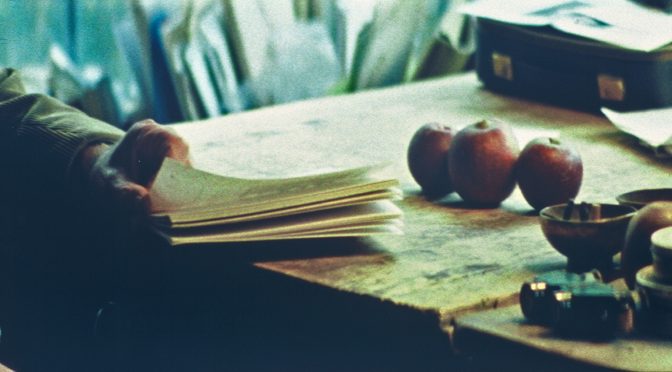This is the preliminary programme. Updates and minor changes will follow.

- This event has passed.
Session 7 – Memory Revisited 3
December 13, 2019 – 2:00 pm – 3:30 pm
Hayk Paul Hambratsum
“The Question Now Is Not What I Have Seen, but How I’ve Seen It”: the Materialization of Memory in Russian Films of Yervant Gianikian & Angela Ricci
The works of Yervant Gianikian and Angela Ricci Lucchi constitute one of the most sustained and unique efforts of filmmakers-cum-visual artists who work with historical archives; what they themselves have come to call “Œuvre-Archive”.
The distinctive quality of their work is complemented by a particular methodology where memory plays an essential and multi-layered role. For example, their very first series of films, known as cinema perfumato or ‘perfumed films,’ testifies to their early efforts in ‘materializing’ memory by releasing specific scents to accompany their short films.
After the introduction of archival films in their work, Gianikian and Ricci Lucchi began to travel extensively and in turn, create their very own ‘filmed archives’.
A series of journey’s to Russia during 1988-1990 in search of archives concerning the Armenian Genocide, eventually branched off into several films about their experiences in Russia, including the many people they met, most of whom were surviving figures connected to the Russian avant-garde.
My paper will analyse how the filmmakers use text, drawings, photographs, voice-over, among other techniques, to create their own sui generis memory in these ‘Russian films’ that will also evoke parallels with the work of W. G. Sebald. The reading will be accompanied by images and short excerpts from the films.
Hayk Paul Hambartsum is a PhD candidate at the Université Paris 1 Panthéon-Sorbonne under the direction of José Moure. His thesis is focused on the fundamental categories of memory, history and the archive as they are re-shaped and transformed in the works of Yervant Gianikian and Angela Ricci Lucchi. His essay “The March as Gesture, the March as Figure: The Archival Prophecy of Uomini, Anni, Vita,” will appear in a forthcoming book on the artist-filmmakers entitled Yervant Gianikian and Angela Ricci Lucchi at Work to be published by Amsterdam University Press.
Miguel Alirangues López
Negativity in Words and Images: a Genealogy for Sebald’s Austerlitz
The relationship that Sebald’s work maintains with images cannot be reduced to the inclusion of photographs in his novels, because in his novels he unfolds a micrological attention to a series of visual works among which the architectural ones stand out, especially in Austerlitz (2001). This relationship does not offer a simple conceptualization and requires not only unraveling the Benjaminian concepts of dialectical image and history that Sebald handles, but also trying to reconstruct a literary genealogy that conform the consciousness of that “tradition of the oppressed” of which Benjamin spoke. The aim of the paper is to study, through the category of negativity and negative memory (taking as an example Mieke Bal’s interpretation of Doris Salcedo’s art) —starting from the idea of negatives in photography and taking its explanatory force to understand the dialectic that can be established between light, enlightenment and their inversions— the tensions inherent in Sebaldian narratives and its relation to visuality. The formulation of a negative relationship between ethical words and images will thus be linked to Sebald’s attention to space and the invisible traces of suffering he finds in architecture, such as in the Palace of Justice in Brussels. Sebald will thus be placed in a negativist literary tradition that could start in Conrad and finds a major reference in Peter Weiss’s Die Ästhetik des Widerstands (1975, 1978, and 1981), in which he developed a form of looking at monuments and buildings through a defamiliarized gaze that could serve to develop a social critique from the reflection of the role that cultural objects (and our monumental concept of architectural beauty) play in cultural heritage understood as spoils of war. Sebald contributes to this tradition through a recovery of visuality that makes his texts become negative images of reality and history, and which, like photographic negatives, are capable of showing —in the best tradition of negative dialectics— the inversions that occur between light and darkness in “moments of danger” (Benjamin).
Miguel Alirangues López holds a Training Program for University Teachers fellowship from the Spanish Ministry of Education in the Philosophy Department at Universidad Carlos III de Madrid. He has also hold two consecutive research fellowship from the Spanish Ministry of Economy at the historical “Residencia de Estudiantes de Madrid”. He is currently developing his doctoral thesis provisionally entitled “The wound in the word. Towards a Literary Theory of the Negativity of Harm.” He holds a Ba in Comparative Literature from the UGR, and two Ma’s in Philosophy from UAM and UC3M. Alirangues is a member of the R&D project “Subjects, Emotions, Structures: Project for a Critical Social Theory” funded by the Spanish Ministry of Economy. His academic interests include contemporary literature and critical theory, and he is currently developing a research visit at Columbia University under the supervision of Marianne Hirsch. Some of his published work can be found at https://uc3m.academia.edu/MiguelAlirangues
